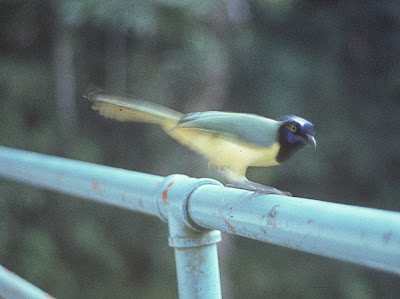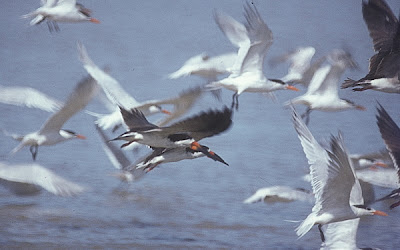07 February 1983. Caripe. We travelled by bus from Puerto de la Cruz east
along the coast and then inland to Caripe.
We walked the last few kms to the Oilbird cave seeing Scarlet-fronted Parakeet on the way. The cave was damp and smelly with large piles
of guano under the ledges the Oilbirds were breeding/roosting on. It was easy to imagine armies of creepy-crawlies
scurrying around in the dark and I was pleased to have reasonable views of such
a unique species and getting back into the fresh air. Sitting below the entrance at dusk as thousands
of Oilbirds flew out was an amazing site and much more to my liking. We camped within earshot of the cave entrance
and heard Oilbirds throughout the night which was magical.
 |
| Oilbird cave entrance |
 |
| it was much more pleasant outside than in |
08-09 February 1983. El Hatillo. We left the Oilbird cave at Caripe early and walked back to
the nearest town seeing Bicoloured Wren
and Pileated Finch along the way. We returned to Puerto de la Cruz and from there another
bus took us a short distance west along the coast to Clarines and we arrived at
the lagoon of El Hatillo mid afternoon. The
area was full of pelicans, cormorants, frigatebirds,
herons, waders (including Wilson’s Plovers),
terns and skimmers with birds being generally much more photogenic than elsewhere on the trip. We slept in the dunes and were birding from dawn
the next morning. If anything it was better than the previous evening and we found Ring-billed
and Lesser Black-backed Gulls, both species appeared to be new for Venezuela, although
perhaps not totally unexpectedly so. We dragged
ourselves away as the temperature started to climb and returned to the main road
where we did not have to wait too long for a Caracas bus. We got off at Guatire before dusk. It was just outside Caracas and somewhere we felt
happier crashing out – more than one night on a deserted city lot might be pushing
out luck too far. We walked to the edge of
town and found somewhere quiet to camp.
 |
| Lagoon at El Hatillo |
 |
| fishermen and pelicans |
 |
| Black Skimmers, Royal Terns and Laughing Gulls |
 |
| Royal Terns |
 |
| Large-billed Tern |
 |
| even more impressive in flight |
 |
| Magnificent Frigatebird |
 |
| Neotropic Cormorant |
 |
| Scarlet Ibis and Louisiana Heron |
 |
| Snowy Egret |
 |
| and Little Blue Heron |
 |
| juvenile Yellow-crowned Night Heron |
 |
| adult Yellow-crowned Night Heron |
 |
| Turkey Vulture |
 |
| Greater Yellowlegs |
 |
| Willet |
 |
| Western and Semi-palmated Sandpipers |
 |
| Semi-palmated Sandpipers |
 |
| Western Sandpiper |
 |
| Short-billed Dowitchers |
 |
| Hudsonian Whimbrel |
 |
| Wilson's Plover |
 |
| Gull-billed Terns |
 |
| Laughing Gull |
 |
| near adult Lesser Black-backed Gull |
 |
| a second, less well advanced Lesser Black-backed Gull with Gull-billed Terns |
 |
| Laughing, Ring-billed and Lesser Black-backed Gulls. The mainland Venezuela gull list goes from one to three (there was a previous Herring Gull record from an offshore island) |
 |
| Masked Water-Tyrant |
10-12 February 1983. Colonia Tovar. From Guatire we caught local buses into Caracas
and then to Colonia Tovar where we spent two nights, birding mainly along the roads
outside of the town. Birds seen included
Black Hawk-Eagle, Chestnut-crowned Antpitta,
Plush-capped Finch, Chestnut-capped Brush-Finch and Yellow-billed Cacique. On 12th we walked back into town and
caught a bus to Maracay and from there to Rancho Grande in Henri Pittier National
Park. The research station was open but Andy
Field, a British research botanist contact we’d been given, was no’t there. Believing we were good friends of his, a notion
we did little to disabuse, the other researchers very generously found us a spare
room to stay in. Walking the tails on our
first afternoon back produced superb views of Venezuelan Wood Quail, White-tipped Quetzal, Black-faced Ant-thrush and Handsome Fruiteater.
13-20 February 1983. Henri Pittier. Based at Rancho Grande we mainly birded the trails
each side of the road and the road both sides of the pass, usually independently
which is how Steve saw Helmetted Currasow
well and I unfortunately didn’t, only getting a poor view of one running away
on another occasion. On 16th we
did a day trip down to Occumare de la Costa, I climbed the trail to Pico Guacamayo
and beyond on 13th and 19th and Pico Periquito on 17th. Andy Field returned a few days into our visit
and thought we were staying there because we were friends of the other researchers! Fortunately we were not immediately
evicted. Andy was extremely helpful in telling
us about the trails and regaling us with tales of how he got David Attenborough
up 100 feet of ropes to his tree platform for the filming of Life on Earth. We declined an offer to do likewise as it
sounded decidedly hairy and I prefer my feet firmly on the floor - after all that
is where the ground skulkers were. It was
with very great sadness that I learned three years later that Andy had died falling
from the very same tree. He was a really
nice guy and had been very helpful to two unannounced and probably fairly obsessive
visitors. On 18th we met Chris Parish, an
American birder living in Caracas, and had an enjoyable afternoon birding lower
down the road to Maracay with him. We reluctantly
left Rancho Grande on 20th and birded our way down to km 8 where we camped. Birds seen during our return visit to Henri
Pittier included Venezuelan Wood Quail, Ornate
Hawk-Eagle, Crested Guan, Lined Quail-Dove, Velvet-fronted Brilliant, White-tipped
Quetzal, Short-tailed and Black-faced and Ant-thrushes, Scallop-breasted and Plain-backed
Antpittas, Grey-throated Leafscraper, Scale-crested Pigmy-Tyrant, Handsome and
Golden-breasted Fruiteaters, Nightingale Wren, Long-billed Gnatwren and Orange-billed
Nightingale-Thrush.
 |
| Rancho Grande looking west over the Portachuelo Pass to Pico Periquito |
 |
| Caribbean clouds spilling over Portachuelo Pass |
 |
| Atlas Moth |
 |
| Harlequin Beetle (not to be outdone) |
 |
| blurred Green Jay - horrible light for photography even in the open |
 |
| Orange-bellied Euphonia |
 |
| Swallow Tanager |
 |
| White-tipped Swift, even birds in the hand didn't photograph very well |
 |
| looking back up to Portacheulo Pass from Occumare |
 |
 |
| Pico Guacamayo ridge trail above Rancho Grande |
 |
| Tarantula on the ridge trail |
 |
| looking down on Rancho Grande from Pico Periquito, Pico Guacamayo top left |
 |
| view south to Maracay |
 |
| looking back up towards Rancho Grande |
 |
| Brown-throated Parakeet |
[blogged May 2013]










No comments:
Post a Comment
Note: only a member of this blog may post a comment.